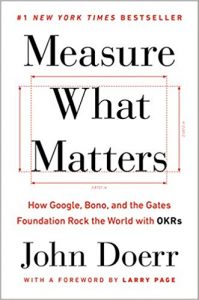 Measure What Matters: How Google, Bono, and the Gates Foundation Rock the World with OKRs. John Doerr
Measure What Matters: How Google, Bono, and the Gates Foundation Rock the World with OKRs. John Doerr
I have a collection of T-shirts received as Christmas gifts from my wife. In that collection is one that expresses an all-too-common management practice, “the beatings will continue until morale improves.â€
Most management books strive to offer better advice. Long-time venture capitalist, John Doerr, has been an evangelist for OKRs, an approach developed at Intel and in vogue across Silicon Valley. “Measure What Matters†is Doerr’s effort to package the approach for wider dissemination. It’s an approach well worth understanding.
OKRs is short for Objectives and Key Results. Doerr characterizes it as “a collaborative goal-setting protocol for companies, teams, and individuals.†Doerr and the other advocates for OKRs are engineers by training and temperament; they think in terms of elegant, interlocking systems. Well-designed OKRs are just that; the kicker is that “well-designed†is the hard part and it’s easy to miss that in the cheerleading.
Doerr defines the system as:
“A management methodology that helps to ensure that the company focuses efforts on the same important issues throughout the organization.†An OBJECTIVE, I explained, is simply WHAT is to be achieved, no more and no less. By definition, objectives are significant, concrete, action oriented, and (ideally) inspirational. When properly designed and deployed, they’re a vaccine against fuzzy thinking—and fuzzy execution. KEY RESULTS benchmark and monitor HOW we get to the objective. Effective KRs are specific and time-bound, aggressive yet realistic. Most of all, they are measurable and verifiable.
Who could object?
The rest of the book elaborates on this and walks us through a number of case studies of the challenges of putting the theory into practice. Doerr is quite explicit that the “regimen demands rigor, commitment, clear thinking, and intentional communication.â€
He acknowledges that “ideas are easy—execution is everything.†Digging into the case studies and thinking about the richer stories that are compressed into the retelling is essential. Doerr tells us this if we are paying attention; “what’s neat about OKRs is that they formalize reflection.â€
Today’s organizations and markets are too complex for a single mind to comprehend. You need to engage as many minds as possible to wrestle with the complexity. OKRs give you a process and a language system but success depends on the conversations that you have with the language.
Doerr only hints at the communications challenges that lurk underneath. How do you distinguish a “goal†from an “objective?†I’ve seen that conversation go in circles for hours. You can have theological debates about OKRs as well. It tempting to talk about the theology, but progress comes when you bring the conversation down to the level where you agree on specifics.
If you’re so inclined you may want to start with Doerr’s TED Talk but “Measure What Matters†needs to be on your reading list.